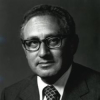Henry A. Kissinger

Henry A. Kissinger
Henry Alfred Kissingeris an American diplomat and political scientist. He served as National Security Advisor and later concurrently as United States Secretary of State in the administrations of presidents Richard Nixon and Gerald Ford. For his actions negotiating the ceasefire in Vietnam, Kissinger received the 1973 Nobel Peace Prize under controversial circumstances, with two members of the committee resigning in protest. Kissinger later sought, unsuccessfully, to return the prize. After his term, his advice has been sought by world leaders...
NationalityGerman
ProfessionStatesman
Date of Birth27 May 1923
CountryGermany
Statesman create; ordinary leaders consume. The ordinary leader is satisfied with ameliorating the environment, not transforming it; a statesman must be a visionary and an educator.
I don't read books, I write them.
Americans believe that you can alter people by conversion, and that everybody in the world is a potential American. The Chinese also believe that their values are universal, but they do not believe that you can convert to becoming a Chinese unless you are born into it.
We cannot always assure the future of our friends; we have a better chance of assuring our future if we remember who our friends are.
Our nation is uniquely endowed to play a creative and decisive role in the new order which is taking form around us.
If peace is equated simply with the absence of war, it can become abject pacifism that turns the world over to the most ruthless.
The one thing man fears is the unknown. When presented with this scenario, individual rights will be willingly relinquished for the guarantee of their well-being granted to them by a World Government, a New World Order.
If it's going to come out eventually, better have it come out immediately.
Don't be too ambitious. Do the most important thing you can think of doing every year and then your career will take care of itself.
The test of policy is how it ends, not how it begins. Foreign policy is the art of establishing priorities. Demonization is not a policy; it is an alibi for the absence of one. The test is not absolute satisfaction but balanced dissatisfaction.
In relations with many domestically weak countries, a radio transmitter can be a more effective form of pressure than a squadron B-52s.
There is no realism without an element of idealism.
Would food be considered an instrument of national power? ... Is the U.S. prepared to accept food rationing to help people who can't/won't control their population growth?
NAFTA represents the single most creative step towards a New World Order.